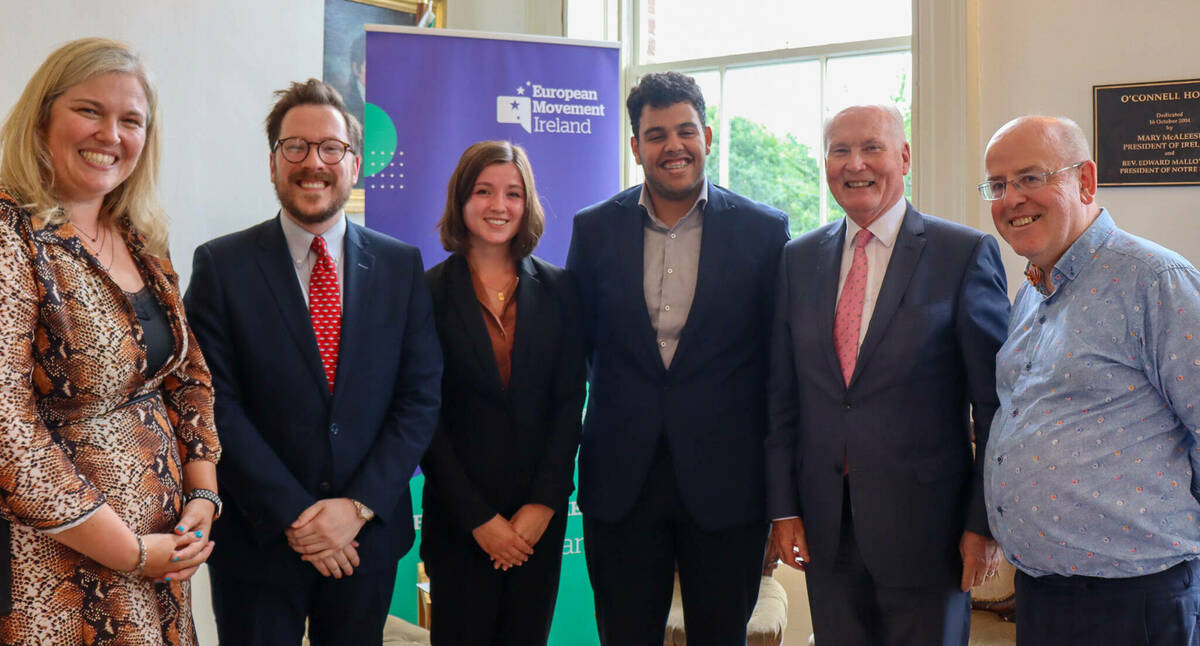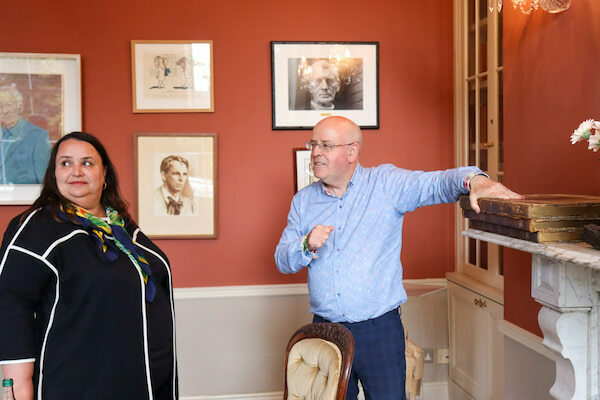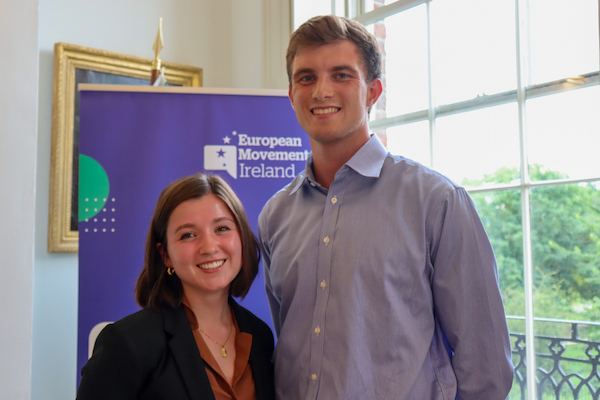Ukrainian Ambassador Larysa Gerasko addresses "War & Peace": Transatlantic Youth Perspectives event

"The menace of war has unfortunately returned to our European continent, to our shared home,” said Noelle O Connell, CEO of European Movement Ireland, as she welcomed the audience of young Irish, Europeans, and Americans to the Notre Dame Forum “War & Peace”: Transatlantic Youth Perspectives event at the Dublin Global Gateway, O’Connell House.
"It is in Ukraine that the fundamental European values of which we all subscribe to are being defended as we speak, this very evening. Human dignity, freedom, democracy, equality, and the rule of law are the very foundations on which the European Union has been built.”
The Notre Dame Forum, established in 2005, has invited a campus-wide dialogue about issues of importance to the University, the nation and the larger world. The 2022 - 23 theme, “War and Peace,” aims to cultivate conversation about the rise of conflict and violence globally.
The co-sponsored event between the University of Notre Dame Dublin Global Gateway and European Movement Ireland created a space for youth voices from Ireland, Europe, and the United States to share their opinions and perspectives on topics of war and peace, particularly in light of the ongoing War in Ukraine and the commemoration of the 25th Anniversary of the Good Friday Agreement that brought peace in Northern Ireland.

A keynote address was delivered by H.E. Ambassador Larysa Gerasko, Ambassador Extraordinary and Plenipotentiary of Ukraine to Ireland, addressing the longer history of Russia’s aggression towards Ukraine, ongoing human rights violations and war crimes, and the global impacts of the War in Ukraine. (Read the Ambassador's keynote address here.)
“We are honored by the presence of Her Excellency Ambassador Gerasko this evening,” said Dr. Kevin Whelan, director of the Dublin Global Gateway. “All of us in Ireland feel we are Ukrainian, too. Our experience is your experience, and we stand with you. For the 80,000 Ukrainians now with us here in Ireland, we wish nothing but the very best and brightest future.”
On an evening dedicated to discussions of war and peace, Ambassador Gerasko was frank and honest with the young audience about her country’s focus on victory alone, especially at a moment when peace with a relentless aggressor is seemingly unachievable.
“Pretending to be ready for peace talks on one hand, on another, Russia keeps ratcheting up its efforts on the battlefield to turn the tide of war in its favor,” she said of Russia’s duplicity. “It is still in their plans to take as much Ukrainian territory as possible, to kill as many Ukrainians as possible, and to exterminate my entire nation.”
Ambassador Gerasko asked the audience to understand the War in Ukraine beyond the country’s threatened borders, seeing the cumulative effects of global food and energy insecurity and migration crisis.
“Here is a challenge for everyone,” she put to the audience at the close of her address. “As Ukraine fights for democracy, freedom, and European values, the world must be united to stop Russian aggression as soon as possible. We are fighting not only for our country – I want to underline once again – but we are fighting for democratic values of the whole world. We are fighting for Europe as well. Stand with us, support us, and win with us.”
After the moving keynote address from Ambassador Gerasko, a youth panel followed, focused on discussions of peacebuilding and peacekeeping in light of the 25th Anniversary of Ireland’s Good Friday Agreement.
The youth panel was moderated by former Irish diplomat Tim O’Connor, who began his work in Ireland’s foreign service in 1974.
“I’m not sure whether this is the University’s idea of a joke, but I am the chair of the youth panel,” O’Connor said lightheartedly to an audience and panel who were, for the most part, not alive when the landmark Good Friday Agreement was signed.
O’Connor was directly involved with the Northern Ireland peace process and was a senior member of the Irish Government Delegation to the Good Friday Agreement negotiations. He later was appointed the Consul General of Ireland to New York, and continues to stay busy in retirement with an appointment by the Irish government as their nominee on the Independent Reporting Commission on Paramilitarism in Northern Ireland.
O’Connor, drawing from his own forty years in diplomacy, opened the panel by contextualizing Ireland’s position on the world stage since gaining independence in 1923.
“Ireland’s first century of statehood was dominated by two themes: emigration and conflict,” he explained. “Happily, over the last thirty years we have turned both of those issues into positives. Emigration has created great links with the Irish Diaspora and driven foreign direct investment back into the country, and conflict has turned into the Good Friday Agreement. 25 years later, it is an imperfect peace but it is a peace, and this is what peace looks like in reality.”
Youth panelists included Raleigh Kuipers as the University of Notre Dame student representative. A Global Affairs and Spanish major with Civil & Human Rights and European Studies minors, Kuipers is currently interning in Dublin with the ARINS project (Analyzing and Researching Ireland, North and South) on the Irish Internship Program.
“In civil conflicts, you have to rebuild your own internal community. You have to create amnesty for people to build peace and move forward,” Kuipers answered when asked about comparative peace processes, drawing from her research of not only the Troubles in Northern Ireland, but of civil war and dictatorship regimes in Spain and South America. “In the context of the war in Ukraine or other similar aggressive invasions of sovereign nations, I would be in favor of accountability and consequences for those war crimes, genocide and human rights violations, committed.”
While Kuipers experience of peacebuilding has come from diverse, international research experiences, fellow youth panelist Dr. Matthew O’Neill, recent PhD graduate from the Mitchell Institute at Queen’s University Belfast and European Movement Ireland EU Information and Research Officer, shared experiences from his own neighborhood.
“When I was younger, the paramilitaries tried to recruit me and my brother to join them,” O’Neill recalled of his childhood in Belfast. “If there was not money invested, particularly in integrated education, we would have fallen into that trap.”
“Peace, to me, means I have been able to take command of my own destiny, I have been able to make my own choices, and I have been able to work in areas and work on projects that mean a lot to me, in both Dublin and Belfast.”
Dr. O’Neill’s research area is within European defense policy, technology, artificial intelligence, and EU Institutions, and, as such, was able to give an expert’s appraisal of Ireland’s ongoing Consultative Forum on International Security Policy.
The public forum – established by Tánaiste Micheál Martin, Minister for Foreign Affairs and Minister for Defence – intends to build understanding and generate discussions on Ireland’s foreign, security, and defense policies. Contributions from the “War & Peace” youth panel event were recorded for European Movement Ireland’s report to the Irish government, ensuring youth voices are represented in the security forum.
“Over the last four days [of the Forum on International Security Policy], we were examining emerging challenges, multidimensional and holistic approaches to modern day battlefields, medical support, chemical warfare, [and] biotech threats,” Dr. O’Nell explained, listing the most prominent topics and questions addressed in the forum. “What actually does human security mean in day to day life with migration? [What does] biological security in the ongoing environmental crisis [look like]? How is food insecurity impacting us?”

“Given Ireland’s history of being colonized, its commitment to neutrality makes sense to me,” said Kuipers when asked about her perspective, as a young American, on Ireland’s policy of neutrality. “Ireland is committed to a values based foreign policy. It has a history of peacekeeping with the UN and focusing on peace instead of creating more conflict.”
Zak Aboukrhes represented the European Youth Parliament Ireland voice on the panel as their President and Director. A current student at Dublin City University in Law and Political Science, his undergraduate thesis focuses on cross border conflict in the Middle East and the European Union’s impact in the region.
“At the European Youth Parliament Ireland, we have been focusing, quite topically, on Ireland’s security policy. The position of Ireland is different from [other European nations] as we value neutrality more than some of our counterparts,” he explained. “With the War in Ukraine, you can see the benefits and drawbacks of that policy.”
O’Connor closed out the panel, bringing participants back to a focus on the island of Ireland and asking them to project the next ten to twenty years of the Good Friday Agreement, and what the role of the young peacebuilders in the panel and the audience will be.
“When asked in an interview ‘What was the biggest achievement of the Good Friday Agreement,’ I said, ‘We found a way to stop the killing,’” O’Connor recalled. “That is actually the first requirement to peace, and that has more or less held, comparative to the years before. This is what a real, living, peace process looks like in its messy complexity.”
Agreeing with and personally thanking O’Connor, Dr. O’Neill expressed feelings of gratitude toward the peacemakers before him, those involved in the Northern Ireland peace process from his own community and the necessary mediators from the United States and the Republic of Ireland.
“Every young person in Northern Ireland stands on the shoulders of giants. When we listen to our elders, we have a very clear sense of what life could be like if that peace was lost.”
“Being 21 myself, I was not alive when the Good Friday Agreement was signed,” Aboukrhes followed. “The most important part of the agreement to me is the soft border, the freedom of travel. My ancestors and my parents didn’t have that.”
“The only way we can break the repetition of our history is through education," Aboukrhes said not only of integrated education in Ireland but of media literacy combatting misinformation. "We have to make sure that we are getting correct information from credible sources and not fall into a rabbit hole of singular opinion.”
Dr. O’Neill ended the evening with powerful words of encouragement to the young audience:
“You are all leaders right now. Don't think you have to wait until some age to be one. Look to your side. That is a person that will be a leader in some form of field. Stop looking in front of you to people that are higher up, thinking that’s what a model of leadership is. It isn't. it's whatever you wish it to be. Each of you have a voice. Take care nurturing that voice. Don’t give it away to some cause you’re not passionate about. Focus on your passion, work towards it, and remember to lift each other up.”